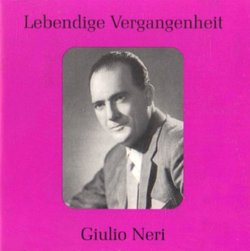| All Artists: Arrigo Boito, Amilcare Ponchielli, Giacomo Puccini, Gioachino Rossini, Giuseppe Verdi, Angelo Questa, Antonino Votto, Arturo Basile, Fernando Previtali, Fernando Prtevitali, Franco Capuana, Vittorio Gui, Milan Opera Orchestra, Orchestra Sinfonica di Torino della RAI Radiotelevisione, Turin RAI Symphony Ochestra, Rome RAI Symphony Orchestra, Fedora Barbieri, Gianni Poggi, Giulietta Simionato, Giuseppe Taddei Title: Lebendige Vergangenheit: Giulio Neri Members Wishing: 0 Total Copies: 0 Label: Preiser Records Original Release Date: 1/1/2000 Re-Release Date: 12/30/2003 Genre: Classical Style: Opera & Classical Vocal Number of Discs: 1 SwapaCD Credits: 1 UPC: 717281895804 |
Search - Arrigo Boito, Amilcare Ponchielli, Giacomo Puccini :: Lebendige Vergangenheit: Giulio Neri
 | Arrigo Boito, Amilcare Ponchielli, Giacomo Puccini Lebendige Vergangenheit: Giulio Neri Genre: Classical |
Larger Image |
CD Details |
CD ReviewsThe last profundo Anton Zimmerling | Moscow, Russia | 10/07/2008 (5 out of 5 stars) "Giulio Neri is an indispensible singer for those who love low bass voices and Italian opera theater. His surname strangely corresponds to his voice type, since 'basso nero' (cf. Ger. Schwarzbass) may be understood as a synonym to basso profundo. Neri died in 1958 and these recordings from 1951-1953 save the unforgettable timbre of the last great genuine basso profundo on the operatic scene. People who think that Hines or Talvela were extremely low are kindly advised to listen to this CD.
Record collectors remember Neri as an unmatched Boito's Mefistofele and Verdi's Grand Inquisitor. Excerpts from both operas (w. conductors Franco Capuana and Fernando Previtali) are here, along with Neri's Sparafucile, Ramfis, Fiesco, Alvise, Basilio and Collin. In my mind, Neri's voice in the middle and low range has a likeness with the voice of his German colleague and contemporary Gottlob Frick. Their constitution was different. Neri was tall and thin, while Frick was little and stout. But the voices were similar: in the middle range Frick sounded more wide, but Neri's basso was a lower instrument - not easy to imagine, since many experts including Wilhelm Furtwaengler claimed that Frick was the 'blackest of the basses'. Not blacker than Neri indeed. Frick used to take the part of King Philippe, while Neri used to terrify all Philippes in the shape of Gran Inquisitore: an eyewitness and Neri's friend, great Italian baritone Tito Gobbi, described how it worked. In the scene with King Philippe (Son io dinanzi al re? - track 4) Neri simply blows down his opponent - Nicola Rossi-Lemeni. This is the best version of this scene all way round: the Neri - Christov variant is weaker. In the high register Frick had an advantage over Neri who sometimes produced a strained or open sound. But in Boito's Mefistofele this does not bother me at all: Neri is a real devil - his Ave, signor, Son lo spirito and Ecco il mondo are tremendous and frightening. Tenor Gianni Poggi is exactly that type of Faust - well-trained, musical but ordinary - which sets off the extraodinary main villain. There are some more similarities between Neri and Frick. They both sang in their mother tongue and did not like to learn foreign languages. In fact, Frick's voice was more round and Italianate, he had fine legato. I guess Neri was especially well-suited for Wagner's operas, and a live recording of 'Lohengrin' with Gabriele Santini/Tebaldi, Nicolai, Guelfi confirms my guess. Neri sang King Heinrich in Italian: did you have any doubts? The excerpts from this recording are not included here, but one should not be ungrateful, since this Preiser CD offers a long series of operatic villains. Even there, where Neri's characters are in a good temper (cf. Collin's Vecchia Zimarra or a duet with Amneris - track 6), you should better stay out from these guys. To sum up: a unique voice and an utmost manifestation of evil force in Italian opera." |
